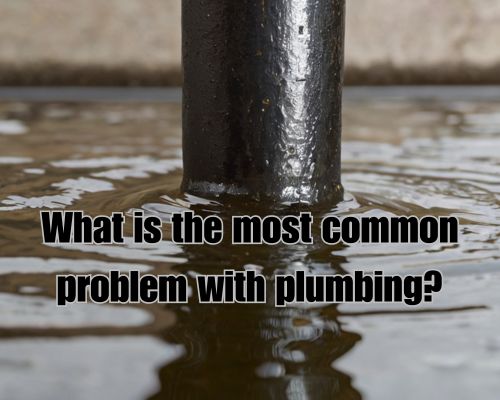Plumbing issues can arise at any time, and homeowners across Australia frequently deal with a variety of problems that range from minor inconveniences to major emergencies. If you’re a homeowner, landlord, or property manager, understanding the most common plumbing problem in Australia can help you take preventive measures to save time, money, and avoid unnecessary stress. So, what is the most common problem with plumbing?

Blocked Drains: The Most Frequent Plumbing Issue in Australia
Among the most persistent and frustrating plumbing issues faced by Australians, blocked drains stand out as the most common. Whether you live in Sydney, Melbourne, Brisbane, or Perth, chances are you’ve had to deal with a clogged sink, toilet, or shower at some point. Blocked drains can be caused by various factors, including accumulated grease, hair, soap scum, food waste, and even tree roots infiltrating underground pipes.
Causes of Blocked Drains
- Tree Root Intrusion – Many Australian homes have lush gardens and native trees, which, while beautiful, can become a nightmare for plumbing systems. Tree roots often seek out moisture and can infiltrate underground pipes, leading to severe blockages and costly repairs.
- Foreign Objects – Items like baby wipes, paper towels, and sanitary products should never be flushed down the toilet, yet many people do, leading to severe pipe clogs.
- Grease and Fat Buildup – Pouring grease or fat down the kitchen sink is a common mistake. Over time, this solidifies and narrows the pipe’s diameter, restricting water flow.
- Hair and Soap Residue – Bathrooms are high-risk areas for plumbing problems, as hair and soap scum often accumulate in drains, causing slow drainage and eventual blockages.
See https://plumberwarragul.com.au/ for more.
Signs of a Blocked Drain
- Slow drainage – Water takes longer than usual to drain from sinks, tubs, or showers.
- Unpleasant odors – A foul smell coming from the drain is often a sign of trapped debris.
- Gurgling sounds – Strange noises when water drains indicate airflow problems caused by a clog.
- Recurring clogs – Frequent blockages suggest an underlying issue that needs professional attention.
The Impact of Hard Water on Australian Plumbing
Another common plumbing issue in Australia, particularly in regions such as Adelaide and Perth, is the presence of hard water. Hard water contains high levels of minerals like calcium and magnesium, which can cause scale buildup inside pipes and fixtures, leading to reduced water pressure, inefficient appliances, and increased maintenance costs.
Effects of Hard Water on Plumbing:
- Reduced water flow – Scale buildup narrows pipes, leading to low water pressure.
- Appliance damage – Water heaters, dishwashers, and washing machines may develop sediment buildup, reducing efficiency.
- Soap inefficiency – Hard water makes it difficult for soap to lather properly, increasing soap scum accumulation in drains.
Leaking Taps and Pipes: A Costly but Preventable Problem
Leaking taps and pipes are another frequent plumbing issue in Australia. While a dripping tap might seem insignificant, it can lead to high water bills and wasted resources. In cities like Melbourne and Sydney, where water conservation is a priority, even minor leaks should be addressed promptly.
Common Causes of Leaky Pipes and Taps
- Worn-out washers – Rubber washers inside taps degrade over time, leading to drips.
- High water pressure – Excessive pressure can stress pipes and cause leaks.
- Corrosion – Older homes with metal pipes are susceptible to corrosion and cracks.
Burst Pipes: A Plumbing Emergency
Burst pipes are a significant issue in colder parts of Australia, such as the Blue Mountains and Tasmania, where freezing temperatures can cause pipes to expand and break. However, even in warmer regions, burst pipes can occur due to excessive water pressure, corrosion, or accidental damage.
Signs of a Burst Pipe
- Sudden drop in water pressure
- Unexplained high water bills
- Damp spots on walls or ceilings
- Water pooling in unexpected places
How to Prevent Common Plumbing Problems in Australia
While plumbing issues are inevitable, proactive maintenance can reduce their frequency and severity. Here are some expert tips to keep your plumbing system in top shape:
- Avoid flushing non-biodegradable items – Stick to toilet paper and avoid flushing wipes, sanitary products, or paper towels.
- Dispose of grease properly – Instead of pouring grease down the sink, collect it in a container and dispose of it in the bin.
- Install a water softener – If you live in a hard water region, a water softener can help prevent scale buildup.
- Check for leaks regularly – Inspect taps, pipes, and toilets for signs of leaks and fix them promptly.
- Schedule professional drain cleaning – A plumber can use high-pressure water jets to clear out stubborn blockages and maintain drain health.
When to Call a Professional Plumber
Some plumbing issues can be fixed with a plunger or DIY methods, but others require professional intervention. If you’re dealing with persistent blocked drains, leaks, or burst pipes, it’s best to contact a licensed plumber like Dean Owens from Plumber Warragul.
Choosing a Reliable Plumber in Australia
- Look for licensed professionals registered with the appropriate state authorities.
- Check customer reviews and testimonials online.
- Get multiple quotes to compare pricing and services.
- Ensure they offer emergency services if needed.
Conclusion
So, what is the most common problem with plumbing in Australia? Blocked drains take the top spot, but other issues like leaking taps, hard water buildup, and burst pipes are also widespread. By understanding the causes and signs of these problems, homeowners can take preventive steps to protect their plumbing systems. When in doubt, always seek the help of a professional plumber to ensure a long-lasting and efficient plumbing system in your home.